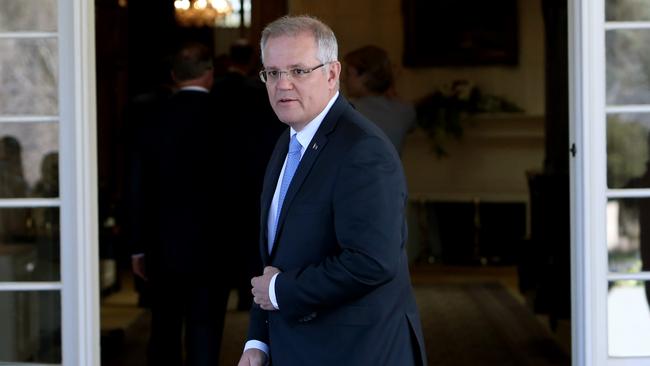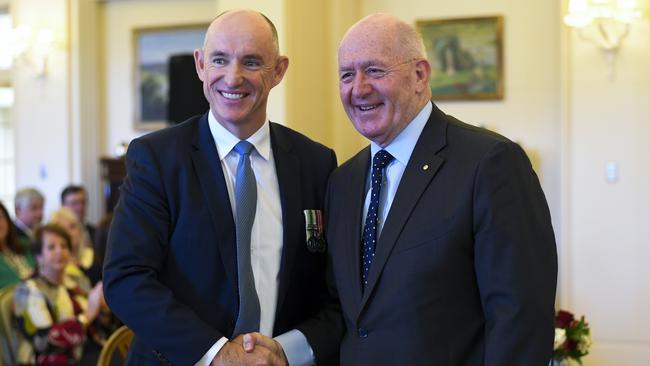Terry McCrann: New PM should see banking royal commission as an opportunity, not a problem
AS treasurer, Scott Morrison opposed the banking royal commission. As prime minister, he’s going to have to deal with its toxic consequences, writes Terry McCrann.
Terry McCrann
Don't miss out on the headlines from Terry McCrann. Followed categories will be added to My News.
AS treasurer, Scott Morrison opposed the banking royal commission. As Prime Minister, he’s going to have to deal with its toxic consequences.
He’s also going to have to deal with them in super-quick time; going to the election with a “trust us, we’ll make the banks behave, some time in the future, if we get re-elected”, just won’t do.
It would also look a — potentially, very big — gift horse in the mouth. He needs to see the bad behaviour of the banks exposed by the RC not as a problem but as an opportunity; a huge opportunity on so many levels.
The most obvious is precisely what he articulated in his post-victory press conference — that it’s one of the best and easily understood ways to prove that he’s on your side. That’s on the basis, that he wasn’t signalling to bank executives that he was on their side.
This most certainly does not mean either that his government should rush to massive new regulation or that he should embark on unremitting populist bank-bashing.
Comments from Assistant Treasurer Stuart Robert to our sister paper The Australian yesterday were very encouraging.
Robert — very sensibly, so he’ll certainly attract unrestrained and unending abuse — said that future banking scandals were ‘inevitable’ and he vowed to resist Left-wing pressure to regulate the financial system to “within an inch of its life”.
As we’ve discovered time and again in the past, that leads to the sort of financial outcomes that are the equivalent to the consequences of the over-regulation of (and forced use of so-called renewables by) electricity generation.
With electricity, it is power that inevitably becomes expensive, unreliable and certainly not plentiful.

In finance, it just as inevitably results in money being rationed, loans attracting higher interest rates, and customers suffering even more risk of financial rip-offs and defaults.
Robert had more to say about good and effective regulation — combined with self-regulation by banks themselves — to the benefit of bank customers as opposed to just grabbing the soft option of more and more blunt regulation.
There was though, one small issue with what he had to say: as of the saying, he was not responsible for financial services.
In the previous Turnbull government there was a specific minister not just responsible for but actually of financial services, Kelly O’Dwyer. Not so — or at least, not so far — in Morrison’s ministry, although Robert said he “expected” to have responsibility.
As assistant treasurer, he obviously has to, unless Treasurer Josh Frydenberg himself is going to assume that role.
Again, it would just not do to give the job to the assistant, assistant treasurer, Zed Seselja — who is just a parliamentary secretary and, as a senator, in the wrong house.
It would also be a big two-fingers to every voter who had a bank account or a superannuation policy — there might be quite a few of them. It would also miss the golden opportunity to actually make the government’s proactive response an election positive.
Sure, this will be no easy task, as Frydenberg and Robert — but above all Morrison as leader and presidential-style political frontman — negotiate the very tricky path between vote-winning populist bank-bashing and maintaining our world-best banking and financial system (for all its failings).
The biggest task is to actually get the right mindset: that PM and government have to be proactive. They don’t have the choice of hiding under their desks, hoping to shift it all onto the regulators: ASIC, APRA and whatever other bunch of letters play some role. Obviously the proactive path is some sophisticated mix of ‘stick’ and if not ‘carrot’ — there’s no way any government can ‘give’ the banks anything this side of manana — nothing that would actually hurt their ability to do business and generate a healthy profit (in the best interests of shareholders, but also of customers and the nation).

Morrison & Co will need the — proactive — help of the bankers: to stress, not whining and begging for relief from regulation, regulators and penalties for bad behaviour, but coming up with effective post-RC solutions, that could actually, on the surface, hurt them.
All this applies to every other vexed policy issue that Morrison faces — from the two big ones of electricity prices and reliability to excessive immigration and population growth, through more specific problems like the funding of Catholic Education.
In each case, he needs to see — and even more, to seize — them not as problems but as election-winning opportunities. And in each case he needs proactive help from the specific relevant players themselves, help that is in their long-term self-interest but is not simple-minded rent-seeking.
MULTI-BILLION THOUGHT BUBBLES
THE Victorian Labor government’s $50 billion — going on $150 billion (if we’re lucky) — ‘underground’ (ha: remember sky rail) ring railway proposal is the biggest and craziest political thought bubble since … well, probably the federal Coalition government’s $50 billion — going on, I’ll be conservative, $80 billion (but also, if we’re lucky) — ‘save-two-or-three seats-in SA’ submarine thought bubble. Which in turn, was the biggest and craziest since … the former federal Labor government’s $29 billion (not just one ha, but half-a-dozen ha-has) — going on at least $80 billion — all-fibre NBN fantasy thought bubble.
What these three horrifying examples tend to demonstrate are that: one, politicians like spending your money; and two, the sheer, basic stupidity — can be and is entirely bi-partisan.



